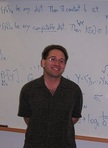The Tenured Toll-Taker
On Friday afternoon—in the middle of a pizza social for my undergrad advisees—I found out that I’ve received tenure at MIT.
Am I happy about the news? Of course! Yet even on such a joyous occasion, I found myself reflecting on a weird juxtaposition. I learned about MIT’s tenure decision at the tail end of a fierce, weeks-long comment war over on Luboš Motl’s blog, in which I assumed the task of defending theoretical computer science and quantum information science as a whole: explaining why these fields could have anything whatsoever to contribute to our understanding of the universe. Indeed, I took the title of this post from a comment Luboš made to me in the middle of the comment war: that compared to string theorists, quantum computing researchers have as little to say about the nature of reality as toll-takers on the Golden Gate Bridge. (Even though the Golden Gate tolls are apparently all-electronic these days, I still found Luboš’s analogy striking. I could imagine that staring all day at the breathtaking San Francisco Bay would lead to deep thoughts about the nature of reality.)
Now, some people will ask: why should I even waste my time this way—arguing with Luboš, a blogger infamous for describing the scientists he disagrees with as garbage, worms, fungi, etc., and even calling for their “elimination”? If I find the limits of computation in the physical universe to be a rich, fascinating, worthwhile subject; if I have hundreds of wonderful colleagues with whom to share the thrill of surprising new discoveries; if a large, growing fraction of the wider scientific community follows this field with interest, if my employer seems to want me doing it for the long haul … then why should I lose sleep just because someone, somewhere, declared that the P vs. NP problem is a random puzzle, of no deeper significance than whether or not chess is a draw? Or because he characterized the entire field of quantum computing and information as a trivial footnote to 1920s physics, fit only for mediocre students who couldn’t do string theory? Or because, on the “other side,” a persistent minority calls quantum computers an absurd fantasy, and the quest to build them a taxpayer boondoggle bordering on fraud? Or because some skeptics, going even further, dismiss quantum mechanics itself as nonsensical mumbo-jumbo that physicists made up to conceal their own failure to find a straightforward, mechanical description of Nature? Likewise, why should it bother me if some anti-complexites dismiss the quest to prove P≠NP as a fashionable-but-irrelevant journey to formalize the obvious—even while others denounce the Soviet-style groupthink that leads the “CS establishment” to reject the possibility that P=NP? After all, these various naysayers can’t all be right! Doesn’t it comfort me that, of all the confidently-asserted reasons why everything my colleagues and I study is dead-end, cargo-cult science, so many of the reasons contradict each other?
Sure, but here’s the thing. In seven years of teaching and blogging, I’ve learned something about my own psychology. Namely, if I meet anyone—an undergrad, an anonymous blog commenter, anyone—who claims that the P vs. NP problem is beside the point, since it’s perfectly plausible that P=NP but the algorithm takes n10000 time—or that, while quantum mechanics works fine for small systems, there’s not the slightest reason to expect it to scale up to larger ones—or that the limits of computation are plainly no more relevant to physics than the fact that cucumbers are green—trying to reason with that person will always, till the end of my life, feel like the most pressing task in the world to me. And it will make no difference whether I’m an unknown postdoc and the other person is Emperor of the Galaxy, or vice versa.
Why? Because, I confess, a large part of me worries: what if this other person is right? What if I really do have to jettison everything I thought I knew about physics, computation, and pretty much everything else since I was a teenager, toss all my results into the garbage can (or at least the “amusing recreations can”), and start over from kindergarten? But then, as I fret about that possibility, counterarguments well up in my mind. Like someone pinching himself to make sure he’s awake, I remember all the reasons why I was led to think what I think in the first place. And I want the other person to go through that experience with me—the experience, if you like, of feeling the foundations of the universe smashed to pieces and then rebuilt, the infinite hierarchy of complexity classes collapsing and then springing back into place, decades’ worth of books set ablaze and then rewritten on blank pages. I want to say: at least come stand here with me—in this place that I spent twenty years of late nights, false starts, and discarded preconceptions getting to—and tell me if you still don’t see what I see.
That’s how I am; I doubt I can change it any more than I can change my blood type. So I feel profoundly grateful to have been born into a world where I can make a comfortable living just by being this strange, thin-skinned creature that I am—a world where there are countless others who do see what I see, indeed see it a thousand times more clearly in many cases, but who still appreciate what little I can do to explore this corner or that, or to describe the view to others. I’d say I’m grateful to “fate,” but really I’m grateful to my friends and family, my students and teachers, my colleagues at MIT and around the world, and the readers of Shtetl-Optimized—yes, even John Sidles. “Fate” either doesn’t exist or doesn’t need my gratitude if it does.
Scott Aaronson's Blog
- Scott Aaronson's profile
- 126 followers



